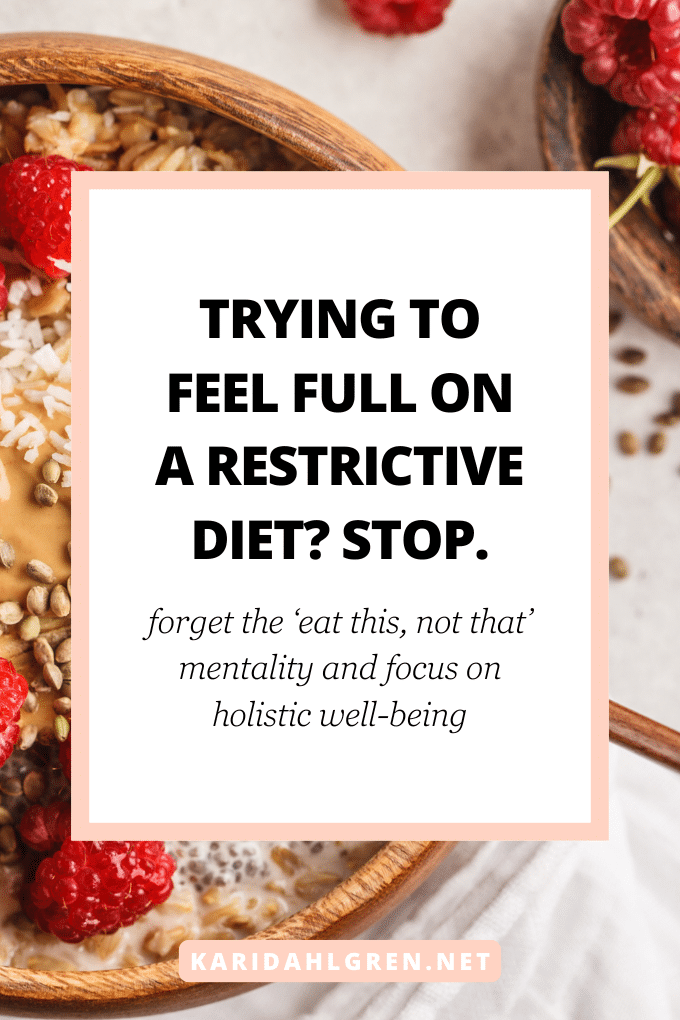
Embarking on a restrictive diet with the goal of trying to feel full can be a slippery slope. Although dramatically reducing calorie intake results in short-term weight loss, restrictive diets often lead to feelings of deprivation, cycles of restriction followed by binge eating, and an unhealthy preoccupation with food.
In this article, we’ll explore why trying to feel full on a restrictive diet often backfires, delve into common myths that lack scientific backing, and offer healthier, evidence-based alternatives. Whether due to medical necessity or personal choice, navigating a restrictive diet requires a balanced approach that prioritizes both physical health and emotional well-being.
Let’s debunk common myths about how to feel full on a restrictive diet and rediscover how to feel satisfied without compromising your physical or mental health.
The Danger of Trying to Feel Full on a Restrictive Diet
Restrictive diets often promise quick weight loss by simply reducing calorie intake, but what’s the real cost of adhering to such strict guidelines? Not only do these diets set unrealistic expectations, but they also disrupt natural hunger and fullness cues, leading to nutritional imbalances and an unhealthy preoccupation with food.
A recent study in the International Journal of Eating Disorders found that certain forms of dietary restraint, particularly avoiding enjoyable foods and limiting intake, significantly increase the risk of loss-of-control eating among individuals with binge-spectrum eating disorders.[1]
This highlights the paradox of restrictive diets: the tighter the restrictions, the greater the likelihood of binge eating episodes.
Rather than trying to “trick” yourself into feeling full on a restrictive diet, consider a more intuitive approach that respects your body’s signals and allows your body to naturally settle upon a healthy weight. Eating when you’re hungry, choosing foods for health as well as enjoyment, and stopping when you’re full promotes not only physical health but also emotional well-being, fostering a guilt-free and healthy relationship with food.
However, giving up restrictive diets isn’t an easily accessible option for everyone. Some individuals, bound by medical or personal needs, might find it challenging. Additionally, the anxiety of giving up controlled eating can be daunting for many, fearing it will lead to unrestrained eating—even though research points to the contrary.
Intuitive eating is an evidence-based approach that leads to greater weight stability than restrictive dieting, better eating habits, and improved psychological health.[2] Still, some people may pursue restrictive dieting anyway for personal or medical reasons. If you find yourself in this category, continue reading to uncover essential myths to avoid and truths to embrace.
Myths: What May Not Help You Feel Full on a Restrictive Diet
Next, we’ll debunk common myths about achieving fullness that might actually be counterproductive, helping you steer clear of ineffective advice. It’s important to remember that the effectiveness of restrictive dieting is a topic of debate in scientific research, so the upcoming advice comes with the understanding that such diets are not universally recommended.
Here are common myths about feeling full on a restrictive diet that lack clinical evidence:
1. High-volume, low-calorie foods help you feel fuller longer
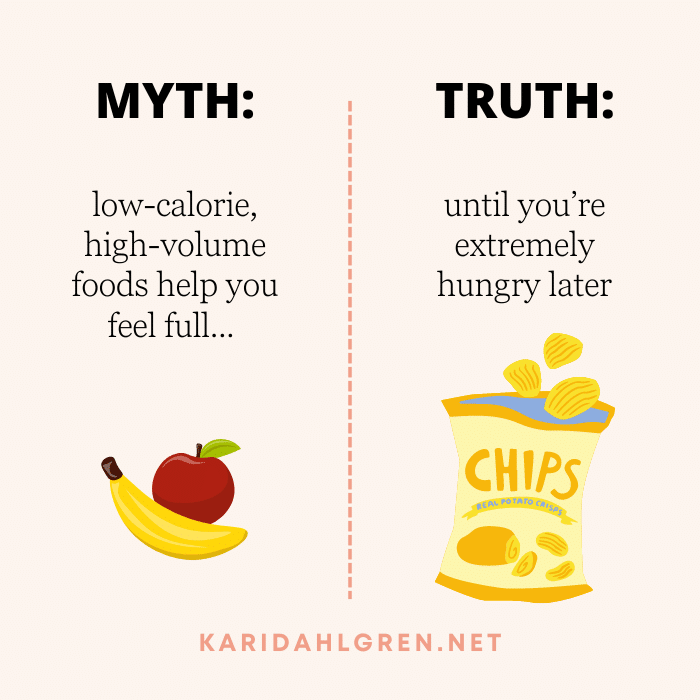
High-volume, low-calorie foods are typically those that contain a lot of water or fiber but have a low-calorie content per serving. Think: vegetables, bone broths, salads with skimpy dressing, and “skinny popped” popcorn.
While it’s a popular belief that consuming high-volume, low-calorie foods can help one feel full and satisfied on a restrictive diet, research suggests that the reality is more complex. A notable study published in EJIFCC found that although larger volumes of food might initially increase feelings of fullness right after eating, this effect does not sustain over time, and crucially, does not significantly influence hunger or food intake later in the day.[3]
Think about it: have you ever tried to eat high-volume, low-calorie foods for breakfast, lunch, and dinner—only to still feel hungry afterward? Did it eventually lead to overeating later on? This is a common result of excessive dietary restraint, which often backfires and fuels the restrict-binge cycle.
2. Drinking water before eating makes you feel fuller longer
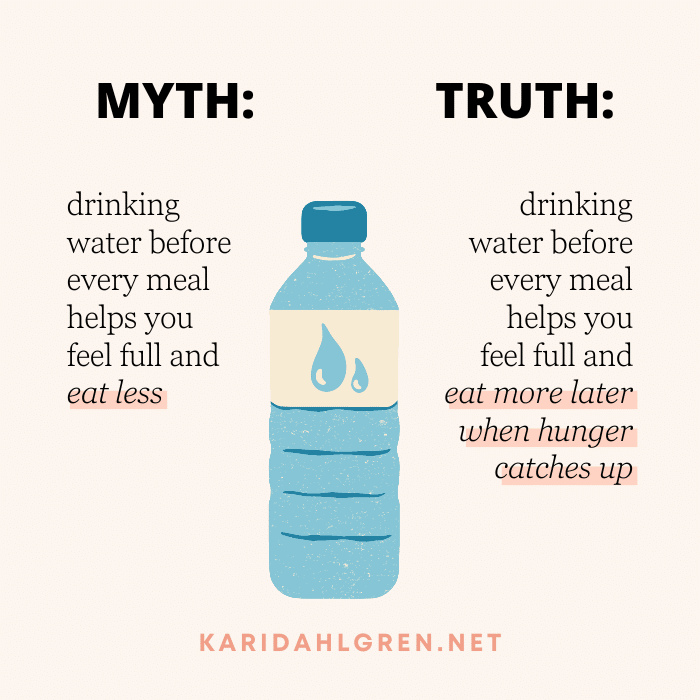
At first glance, drinking water before every meal can help with short-term weight loss. A study published in Obesity found that people who ate a low-calorie diet and consumed water before each meal lost more weight than people who only ate a low-calorie diet.[4] That said, the study spanned only 12-weeks.
An abundance of clinical research shows that short-term weight loss is often followed by long-term weight gain. A review study published in Obesity Reviews found that one-third to two-thirds of the weight lost is regained within 1 year and almost all is regained within 5 years.[5] The study also found that at least one-third of dieters regain more weight than they lost—a phenomenon known as weight overshoot.
While drinking water before meals can help temporarily enhance the feeling of fullness on a restrictive diet, the long-term outcomes are less clear and often not favorable. This underscores the complexity of weight management and the importance of considering sustainable dietary habits over quick fixes.
3. Skipping high-fat, high-sugar, highly processed foods make you feel fuller longer
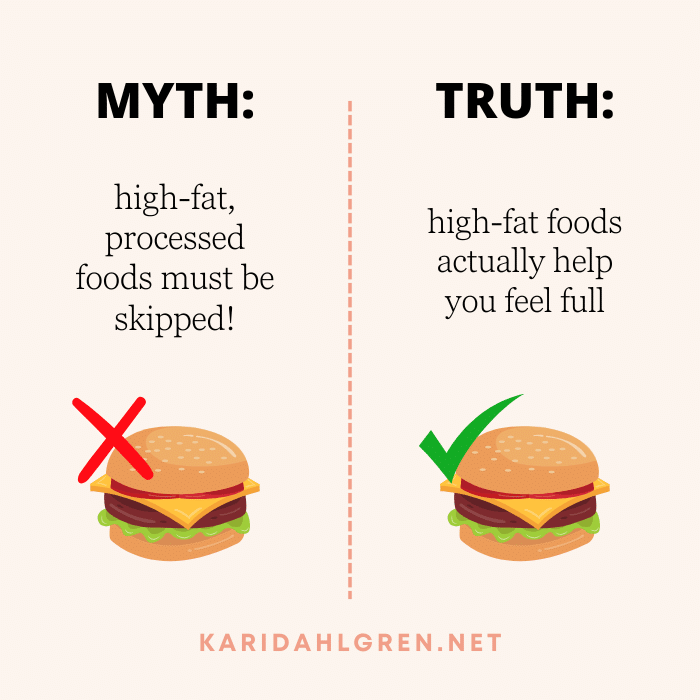
The belief that avoiding high-fat, high-sugar, and highly processed foods leads to longer-lasting fullness is an oversimplification that doesn’t fully align with nutritional science. In fact, high-fat foods can be quite satiating. Fats slow down the digestion process, which can extend the feeling of fullness after a meal.
While highly processed foods often lack essential nutrients, not all high-fat or high-sugar foods are detrimental to health in moderation. According to a study published in the British Journal of Nutrition, low-nutrient foods can comprise up to one-fifth of overall intake without compromising overall nutrition.[6] Furthermore, the role of enjoyment in eating cannot be understated.
A comprehensive review in PLoS One found that pleasure from eating often correlates with healthier eating patterns.[7] The review suggested that pleasure can indeed act as a lever for promoting healthier eating habits by focusing on sensory experiences and the enjoyment of food. Therefore, instead of avoiding your favorite foods on a restrictive diet, choose foods based on health as well as enjoyment to support long-term healthy eating habits.
Truths: What Might Help You Feel Full on a Restrictive Diet
While restrictive diets are not generally recommended, there are scientifically backed strategies available to help you feel full on a restrictive diet, if that’s what’s right for you. It’s important to listen to your body and choose methods that support personal well-being.
Here are some tips for feeling full on a restrictive diet that are backed by sound clinical evidence:
4. Fiber helps you feel full
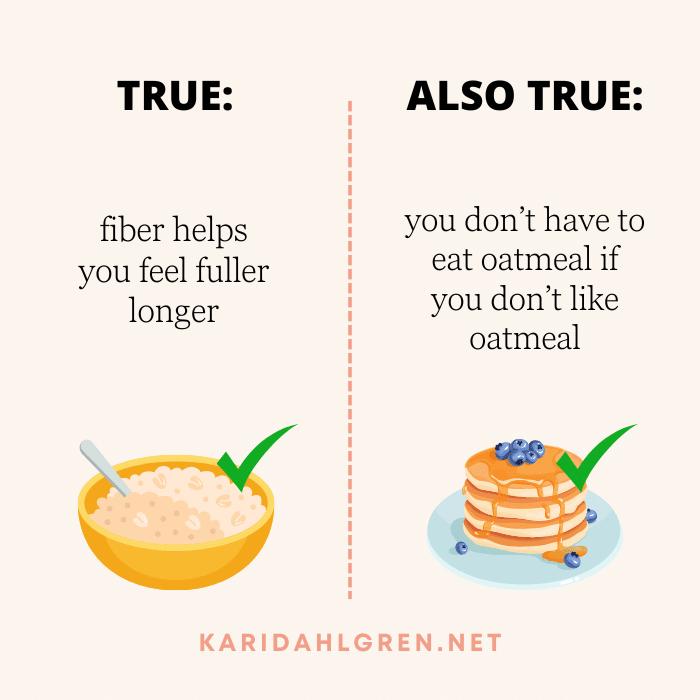
Fiber-rich foods like oatmeal and beans are great for enhancing fullness, especially on restrictive diets, due to their ability to slow digestion.[8], [9] While these foods can help manage hunger effectively, it’s important to enjoy what you eat. If you like oatmeal and beans, include them in your meals and enjoy! However, if you don’t actually like them, don’t force yourself to eat specific foods just to feel full, as this can lead to disordered eating patterns. Always prioritize health as well as enjoyment of your meals to maintain a healthy relationship with food.
5. Dietary fat help you feel full
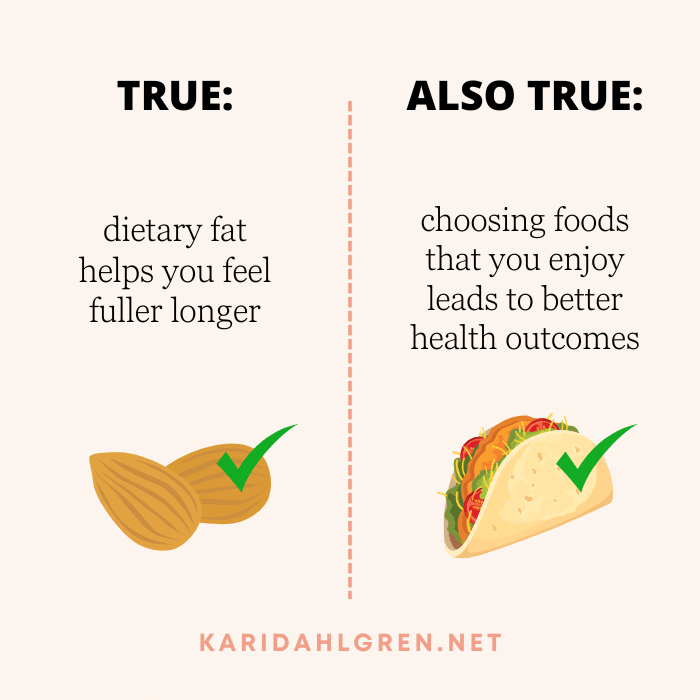
Dietary fat is often misunderstood, but it’s a crucial component for feeling satiated, as it helps slow down digestion and prolongs the sensation of fullness. Fat’s satiety-enhancing properties are particularly beneficial on restrictive diets, where managing hunger can be challenging.
Including healthy fats from sources like avocados, nuts, seeds, and olive oil can not only enhance the flavor of your meals but also support your dietary goals by keeping you fuller for longer. However, it’s important to consume fats that you enjoy and fit well into your dietary preferences.
6. Sensory-specific satiety helps you feel satisfied
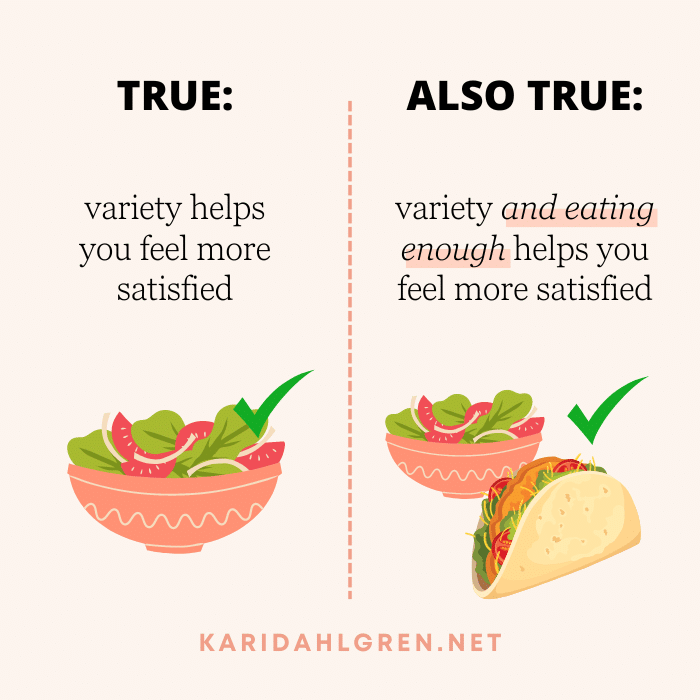
Sensory-specific satiety is a phenomenon where the satisfaction from eating a particular food decreases the more you consume it, while other foods remain appealing.[10] This is why you might get tired of eating the same thing during a meal but can still find dessert tempting when it’s something different. Introducing variety into a restrictive diet can help manage this phenomenon, making meals more satisfying.
However, you don’t need a restrictive diet to enjoy these benefits. When you let go of external food rules and start listening to your body’s internal cues of hunger and fullness, you’ll naturally consume a varied, balanced diet.[11] Intuitive eating can offer the same satisfaction without the stress of tracking every bite.
In fact, research published in Psychosomatic Medicine shows that meticulous calorie counting can increase psychological stress and elevate cortisol levels, which may even lead to weight gain.[12] For overall well-being, a relaxed, intuitive approach often works better than rigid, stressful dieting.
7. Protein helps you feel full
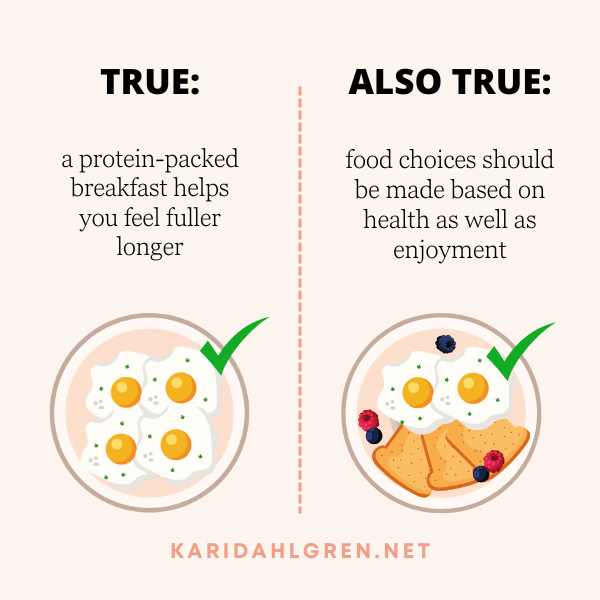
Protein is pivotal in managing hunger and enhancing satiety, especially during weight loss efforts. A study published in the International Journal of Environmental Research and Public Health demonstrated that a protein-rich breakfast of eggs helped reduced food intake compared to a carbohydrate-rich breakfast of cereal.[13] Participants consuming the egg breakfast reported not only lower hunger levels but also consumed fewer calories at their next meal.
Incorporating protein-rich foods like eggs into meals, particularly at breakfast, can be an effective strategy for enhancing satiety and managing daily calorie intake without the need for strict calorie counting. This approach can help reduce the sensation of deprivation that often accompanies dieting, making weight management efforts more sustainable and less stressful; that is—if you like eggs. As always, focus on health as well as enjoyment for a sustainable path to both physical and mental well-being.
Feel Full, Not Deprived
As we wrap up this exploration of how to feel full on a restrictive diet, it’s clear that the path to effective and healthy weight management isn’t through severe restrictions or battling with your body’s natural cues. Instead, it’s about understanding the science of satiety, debunking prevalent myths, and embracing strategies that genuinely enhance your meals and your life.
Navigating the complexities of diet culture can be overwhelming, but remember, the most sustainable diet is one that includes pleasure, respects your body’s signals, and meets your nutritional needs without fostering guilt or obsession. If you take away anything from this discussion, let it be the encouragement to listen to your body, incorporate foods you genuinely enjoy, and approach eating with a mindset that values both health and happiness.
To learn more about stopping compulsive eating without dieting ever again, see my free resources below.



